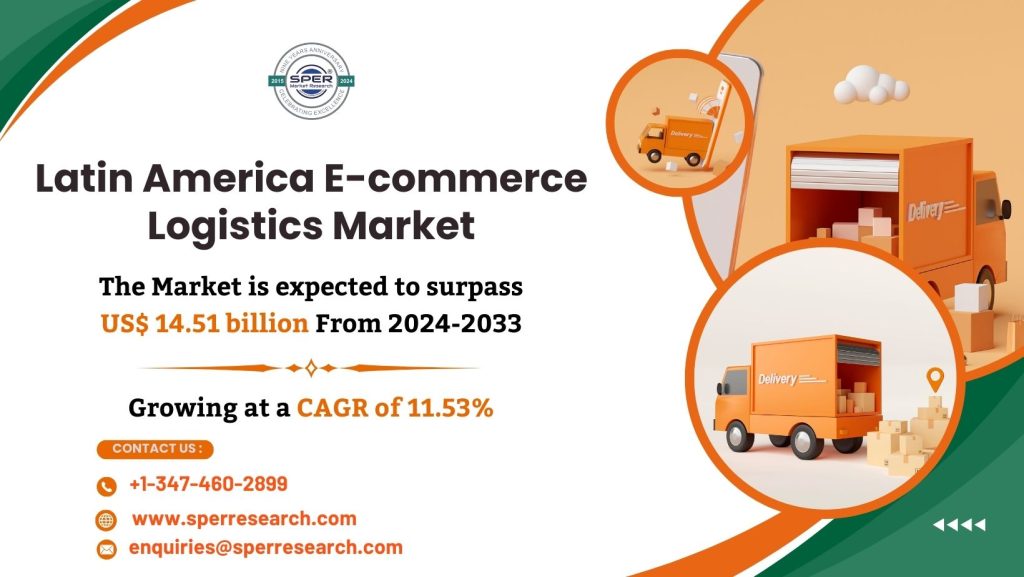Logistics is the systematic process of planning and carrying out an operation that involves the transportation of goods, services, information, and funds from point of origin to point of consumption. Transportation, warehousing, material handling, packaging, inventory management, supply chain management, and logistics network design are some of the many categories covered. Logistics provides robust properties such as efficiency, dependability, scalability, and adaptability. It is widely utilized in a variety of industries, including retail, e-commerce, manufacturing, international trade, healthcare, government and defence, and agriculture. Logistics helps to reduce costs, improve delivery performance, boost customer satisfaction, optimize inventory levels, and increase overall efficiency. Furthermore, it offers a competitive edge, risk minimization, sustainability, global reach, and contribution to economic progress.
According to SPER Market Research, ‘Latin America E-commerce Logistics Market Size- By Service, By Business, By Destination, By Product- Regional Outlook, Competitive Strategies and Segment Forecast to 2033’ states that The Latin America E-commerce Logistics Market is estimated to reach USD 14.15 Billion by 2033 with a CAGR of 11.53%.
Drivers:
Latin America E-commerce Logistics Market is expanding rapidly, owing to various factors. One of the primary reasons driving market expansion is the strong economic growth in several Latin American countries, which boosts commerce and demand for better logistics solutions. Furthermore, the industrial sector’s continued expansion necessitates effective logistics for both raw material supply and final goods distribution. Aside from that, the huge rise of the e-commerce sector, which is raising demand for last-mile delivery services, is helping the market grow. Furthermore, broad infrastructure development, particularly in transportation networks and ports, which improves the efficiency of logistical operations, is driving market expansion. Aside from that, the growing number of free trade agreements within the area and with other nations has increased the demand for logistics services.
Challenges:
Several challenging factors limit the expansion of the Latin American logistics market. Inadequate transportation infrastructure, such as bad roads, congested ports, and restricted rail networks, can impede effective logistical operations. Complex customs procedures, bureaucratic red tape, and uneven trade policies can all complicate logistics and drive up costs. High levels of criminality and cargo theft in some areas might discourage investment and disrupt logistics operations. High levels of criminality and cargo theft in some areas might discourage investment and disrupt logistics operations. Stricter environmental rules may increase expenses for logistics companies, hurting their profitability. Latin America’s diverse topography can hamper logistical networks, especially in rural places. The presence of informal logistics providers can create rivalry that undercuts legal operators, hurting overall market growth.
Request For Free Sample Report @ https://www.sperresearch.com/report-store/latin-america-e-commerce-logistics-market.aspx?sample=1
Impact of COVID-19 on Latin America E-commerce Logistics Market
The COVID-19 outbreak has impacted Latin America’s e-commerce logistics business. Lockdowns and social distancing measures hastened the adoption of online purchasing, resulting in a sharp growth in e-commerce revenues. The boom in online orders increased demand for effective last-mile delivery services, forcing logistics firms to adjust swiftly. Many logistics organizations have used digital technologies to handle rising volumes, improve tracking, and improve customer service. The epidemic disrupted supply chains, resulting in delays and issues in inventory management, prompting businesses to reconsider their logistical strategy. To reassure clients, logistics companies established severe health and safety procedures, such as contactless delivery and better cleaning protocols. The pandemic caused changes in legislation and policies governing logistics activities, including customs processes and import/export regulations.
Latin America E-commerce Logistics Market Key Players:
E-commerce Logistics Market is dominated by Brazil due to its Economic size, as it is the largest economy in Latin America. Some of the key players in the market are B2W Digital, Bollore Logistics, CEVA Logistics, CH Robinson Worldwide Inc., DB Schenker and others.
For More Information, refer to below link: –
Latin America E-commerce Logistics Market Size
Related Reports:
Follow Us –
LinkedIn | Instagram | Facebook | Twitter
Contact Us:
Sara Lopes, Business Consultant – U.S.A.
+1-347-460-2899



